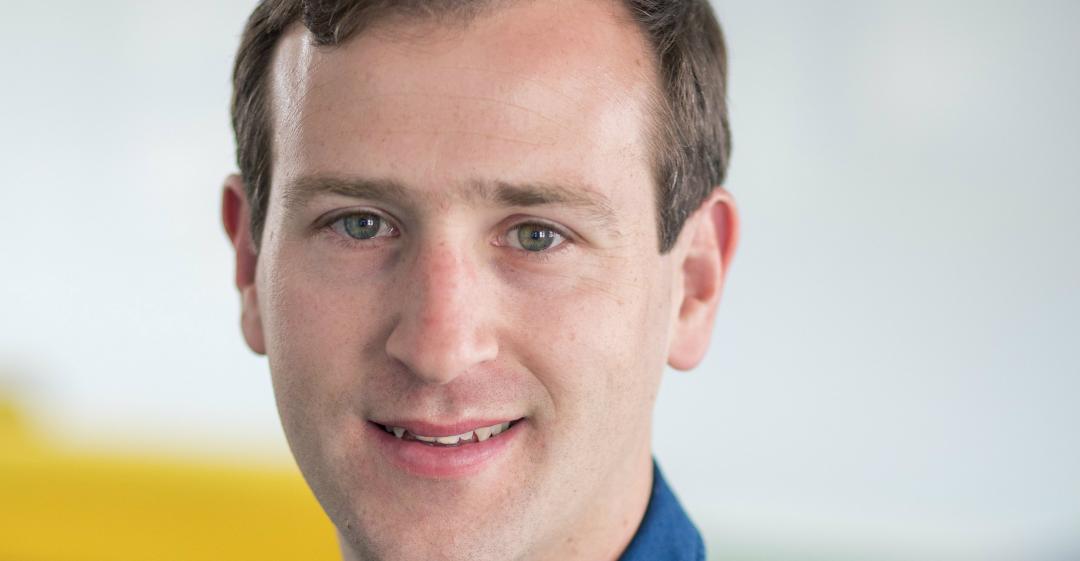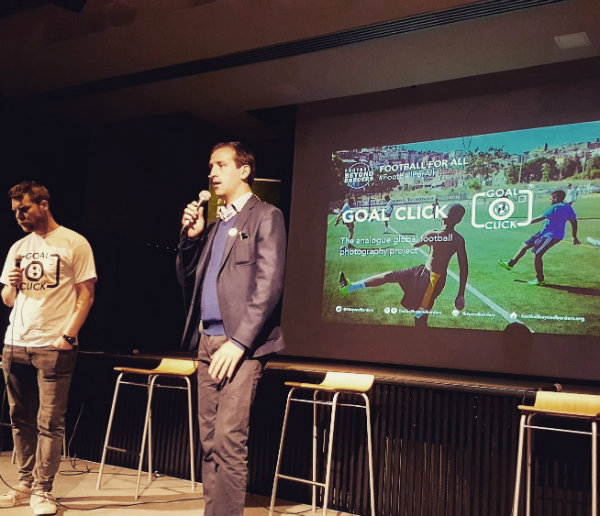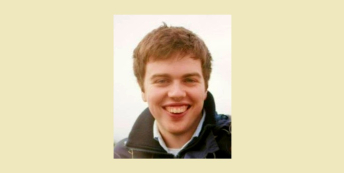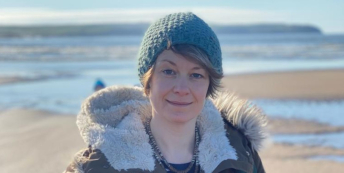“I'd plateaued in my day job; after ten years I needed something new.”

What work were you doing previously?
I worked in sports marketing and sponsorship for ten years, for a number of agencies within WWP (the world's biggest advertising and media conglomerate).
It was very much more commercial and corporate compared to what I do now.
What are you doing now?
For the last four years, I've been running a project called Goal Click.
It's a global media and photography project. Our aim is to help people understand each other through football.
We essentially find people from every country in the world and ask them to tell us a story about themselves or their country through football. We give them a disposable camera each, we also take their written words and audio as well. It allows people to tell their own stories in an unfiltered way.
Why did you change?
I'd always wanted to set up my own business or organisation, looking at this type of storytelling, using football and sport and how it can explain the world.
I'd plateaued in my day job, and after ten years I needed to freshen myself up with something new – I felt that would be healthy.
And I wanted to have a go at being an entrepreneur!
I studied sport in war zones and I'd always wanted to do something that was a bit more journalistic and creative, something that I could be in control of.
I didn't necessarily dislike my old work. The quality of my work–life balance was good, but I really believed in this idea and wanted to do this for myself.
So, my shift was a positive move, rather than a change because I disliked my former life.
When was the moment you decided to make the change?
The first real moment I decided to commit to Goal Click was the launch of our first exhibition, a couple of summers ago.
We'd operated the project under the radar for the first couple of years, as a hobby. Then, we did an exhibition for five weeks and at that launch night, where there were 250 people, speakers and photographers from around the world, I looked around and realised that out of nothing we'd created something. I saw then that one day I could do this full-time.
Two years of working on the project alongside my day job work got me used to the idea that this was what I really wanted to do. I got more comfortable as we went along. Ahead of the World Cup this year, I thought that this was the time.
Looking back, I remember telling the CEO at my last company that I planned to be like him one day, which he liked! Within a year, I'd started Goal Click.
Are you happy with the change?
I couldn't be happier.
That's not to say it's all a sure-fire thing and I'll be doing this for the rest of my life (though, I hope so), but the one thing I can categorically say is that I'm glad I did this because I'm proud of what we’ve achieved.
It was the right time, the right moment, and I'd got as much as I could out of the ten years of my previous working life in terms of experience, connections and knowledge.
I'm 31, without a wife, without a house, without a mortgage, without kids, and that's very conducive to taking that kind of gamble. It's easier for me in my life situation to do this than it would be for people who have those ties. So I'm very lucky that I could do this now. Three or four years later or earlier and it wouldn't have been so right.
It's almost been a 'Goldilocks' moment – everything has been 'just right' for me to do this. If it doesn't succeed, I'll be very disappointed, but if it does, it's the perfect story!
What do you miss and what don't you miss?
In many ways it's been nice to tighten the belt, financially speaking.
I'd been looking for active ways in which to cut down on frivolous spending, not least on alcohol and very fancy meals, not that I lived a particularly fancy life beforehand. Telling your friends and having them understand that you can’t go on holiday, go for those drinks, or have that meal, is hard but your real friends get behind it. It requires a mental shift whereby disposal income is no longer your friend.
I knew my lifestyle wasn't extravagant and I spent less than what I earned but I didn't really notice what I spent. Whereas now I'm hyper-aware. It's a case of weighing up the priorities – is this holiday worth it when I could spend the money supporting my business instead?
How did you go about making the shift?
As I've mentioned, I co-founded Goal Click and ran it as a side/passion project for three and a half years.
Then, four months ago I decided to quit my job and devote my full-time efforts to Goal Click.
I'm quite a big believer in starting up projects on the side to see how they're faring and building things gradually, rather than leaping into something new without careful planning. So it was important to me that I built Goal Click to the point where I knew it wasn't a wild punt and I could see that it was something that was worth devoting my time to.
I worked on it a little every week for two years until I got to that moment. Basically I was working evenings and weekends, for the pure love of it. I did a couple of hours a night and then one big session at the weekend. A lot of the project is network management of the people we have, photographers and storytellers, so I was growing the project by liaising with them regularly. Also, writing and publishing content as and when it was ready.
It's a crowd-sourced media project so I can do it from my computer. It really required time and application.
Now, I do what I used to do in two weeks in half a day. It had been such a slow-burn process before, which is why it had taken two years to even countenance a first exhibition. Whereas now, I feel we could turn something around very quickly.
What didn't go well? What wrong turns did you take?
After our first exhibition I had knocked myself into the ground and needed a break from it.
My learning was that you don't have to be 'on' the whole time, you need to have some down time in order to make sure you don't get frustrated. If you lose all of your free time to what is your passion project you can end up resenting it.
Thankfully, I never got to that point, because I always built in some time to take a break from things. Some people can go too hard at something and not look after their health and mental well-being. I knew I wanted to do this, I was passionate about it, so it was easier to find that extra ounce of motivation that in the day job I was paid for. It never felt like a chore because I could see the results: the validation from good media coverage, the kind words from people who respected what we were doing – it all suggested we were on the right track.
I've always found it easier to work hard at something I’m passionate about, because I believe in it.
How did you handle your finances to make your shift possible?
The project has paid for itself through brand sponsorship and through more consumer-focused monetisation, but the lion's share of it has been through a partnership with Adidas.
While I was doing the full-time job there were no other costs to cover. And the costs of the project itself are not massive, because we're dealing with crowd-sourced business, so the finances have not been that difficult to manage.
I saved for pretty much the whole time I've been doing the project, so that I could take six to nine months to work on this project, to turn it into a fully functioning media organisation. I'm not taking a wage for potentially the first twelve months, and I saved to be able to do that.
I never had to work out costs against incomings. I'd basically got to a point where I knew I'd saved enough to support myself for six to nine months.
I'm aware of my overall spending and outgoings: how much per month I have going out of my bank account. In reality, I'm very lucky in that I have a potential fall-back position (moving in with family), which may happen, but I want to stand on my own two feet with this business. So, it was important to factor in my living costs.
I'm hoping that by March next year we'll be in a position to start a payroll.
What was the most difficult thing about changing?
My general view on it is pretty positive.
If anything, I have more time now than I did before, because I was doing this in my free time before!
Knowing that ultimately you're where the buck stops makes you aware of the need to make it what you will – there's no more excuses, it's not just a nice project anymore, it's serious and you have to learn to work commercially.
Goal Click has always been thought of very highly but we've never asked people to put their hands in their pockets. Whereas now we're having to develop a totally different mindset and ask people to pay for it.
I'm very aware of the fact that the time for it to be a nice, fun passion project is over, and we may have to look at it from a colder, harder, business lens.
What help did you get? 
We've been fortunate in that we've had a few friends help us with our design and our website, and some legal considerations.
Nothing too drastic, but things that we wouldn't necessarily have been able to pay for.
Broadly, 99% of the work has been done by myself and my co-founder. We now have a third member in our Goal Click collective. Ultimately, our aim is to put us all on the payroll in the next six months.
What do you wish you'd done differently?
If I could have my time again, I would be a bit more commercially savvy.
Because this wasn't my chief source of income, at times I underplayed the value of what I was creating. It took us quite a long time to be commercially savvy, which we are now, because we know the importance of having an income!
Before, we did a lot of things for free, which we wouldn't do now. That's something you learn though when you haven't run a business before and you're used to accepting a salary.
What would you advise others to do in the same situation?
I do think that starting something in your free time to test and learn from it is a very good idea while you have an income to support yourself.
You'll do all the hard work of developing the concept and understanding what works and what doesn't while you're being supported by your full-time job. I think it's risky to quit at the first sign of an idea.
Go through that time. It might be tiring, it might be hard to juggle two jobs, but ultimately the business you create will be better for it. You also won't press panic buttons because you'll be confident in what you're offering.
We've been very fortunate in that we've had some great people around us to offer pro-bono assistance. Having champions of our work, friendly people from our network that want to see us succeed, has really helped us.
I generally see Goal Click as the sum of a lot of good parts, bringing people together from around the world to make a whole. I think that extends beyond what we've created: you're not going to have all the skills yourself, but you will need to bring different people in with different expertise. If you can, try to get those people around you in the early stages because in the long run it will be enormously helpful.
To find out more about Matthew's project, visit: www.goal-click.com.
What lessons could you take from Matthew's story to use in your own career change? Let us know in the comments below.



